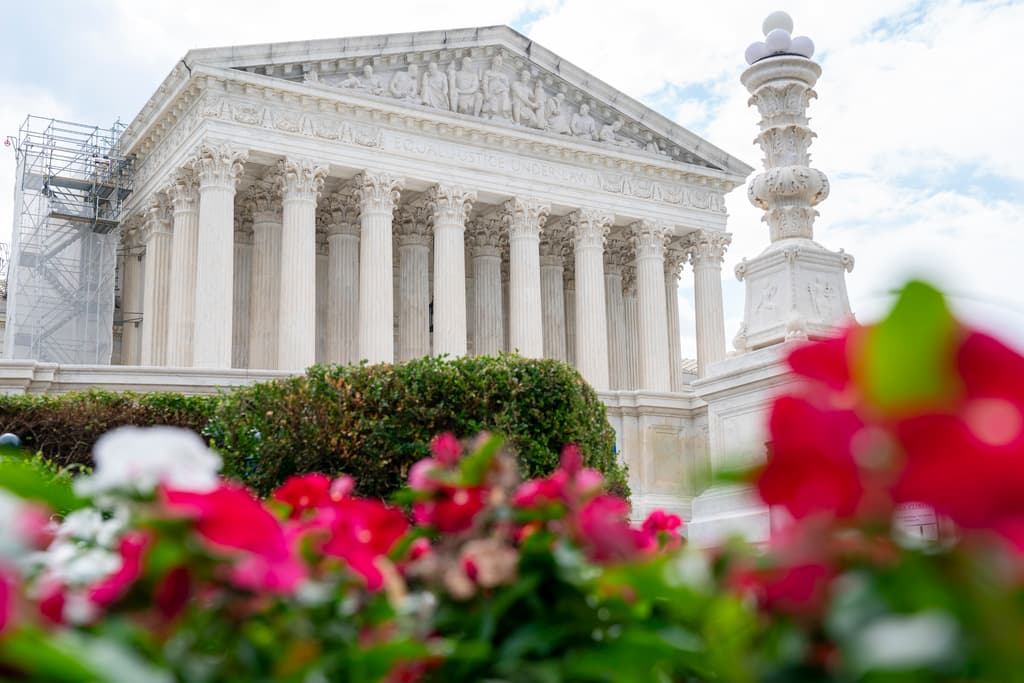How About a Grand Bargain on Term Limits?
In return for term limits on the goose of the Supreme Court, let’s limit the terms of ganders in Congress.

President Biden, who was first elected to the Senate in 1972, nearly 52 years ago, is reportedly considering proposing term limits on Supreme Court justices. The policy merits are debatable but the entertainment value is unquestionable.
It takes a certain brass for Mr. Biden, of all people, to seize as a signature issue the danger of sticking around in a government job beyond a sell-by date.
It’s ironical, too, to see Mr. Biden want to rewrite the rules in the face of an adverse high court opinion. Mr. Biden, after all, is the one carping that “MAGA Republicans do not respect the Constitution” and “do not believe in the rule of law.” Biden himself, though, doesn’t want to obey the court on abortion rights, race-based college admissions, student-loan forgiveness, and presidential immunity.
The hypocrisy extends beyond Mr. Biden to Congress, perhaps offering an opportunity for a grand bargain — a deal that includes term limits not only for justices, but for legislators. Who, after all, could initiate a constitutional amendment limiting the terms of justices?
There is the Senate majority leader, Charles Schumer, who has been in Congress since 1981. That’s 43 years, longer than any of the nine justices have sat on the high court. The chairman of the Judiciary Committee, Richard Durbin, a Democrat, has been in Congress since 1983. That’s also a longer tenure than any current justice.
In the House, term limits for justices would be considered by Representative Nancy Pelosi, who has been in Congress since 1987. That’s 37 years, also longer than any of the nine justices. The top Democrat on the House Judiciary Committee, Jerrold Nadler, has been in Congress since 1992, a decade longer than any justice except Clarence Thomas.
Republicans on the Senate Judiciary include Lindsey Graham, who has been in Congress since 1995, and Charles Grassley, who has been in Congress since 1975, nearly half a century.
The Supreme Court seems to be working pretty well as it is. If, though, Democrats disagree and insist term limits on the justices would be an improvement, Republicans use the initiative as negotiating leverage to cap tenure for congresspersons, too.
Conservatives have flirted with the idea of limiting the power of voters to send one of their representatives to Congress for more than a set number of terms.
Vice President Daniel Quayle endorsed the approach in a June 12, 1992 speech to the Federalist Society. “We have to disrupt the cycle of almost certain re-election and think about Congress the way the founders did, not as a career, but as a temporary tour of duty,” Mr. Quayle said.
“Since the Constitution has limited Ronald Reagan and George Bush to two terms, we ought to be fair to the other elected branch, and limit the terms of people like Ted Kennedy and Howard Metzenbaum and the rest of that Democratic Congress up there,” he said.
Newt Gingrich’s 1994 “Contract with America” that won a House majority for the Republicans included a promise of a vote on a “citizen legislature act,” imposing “term limits to replace career politicians with citizen legislators.”
A measure to cap at six the number of terms for which voters could send a particular representative to the House members or limit to two the number of terms that states could send a person to the Senate passed the House by a vote of 227 to 204 on March 29, 1995, but fell short of a two-thirds threshold and also failed to win Senate support.
Subsequently, the Supreme Court, in U.S. Term Limits v. Thornton, said term limits for Congress would require a constitutional amendment. In its ruling, the majority allowed that “such limits may provide for the infusion of fresh ideas and new perspectives, and may decrease the likelihood that representatives will lose touch with their constituents.”
A dissent by Justice Thomas observed that “Current federal law (enacted, of course, by congressional incumbents) confers numerous advantages on incumbents, and these advantages are widely thought to make it ‘significantly more difficult’ for challengers to defeat them.”
Once Republicans controlled the House, the urgency of term limits seemed to fade, even as incumbent reelection rates stayed high.
Donald Trump did back term limits in his 2016 campaign. Senator Ted Cruz in 2023 introduced an amendment to limit senators to two six-year terms, though he himself is also running this year for a third term.
Getting Democratic members of Congress to agree to caps on their time in office is unlikely; senior lawmakers such as Messrs. Schumer and Nadler relish their own power too much to limit it voluntarily. The only thing that might change their minds would be a Republican landslide in 2024. With Congress as with the court, losses have magical power to convince politicians of the need to change the rules.

